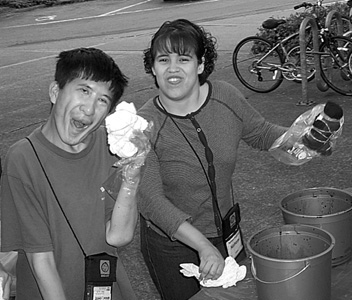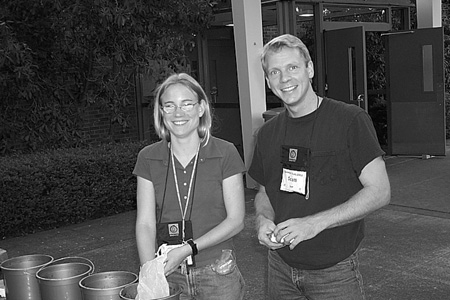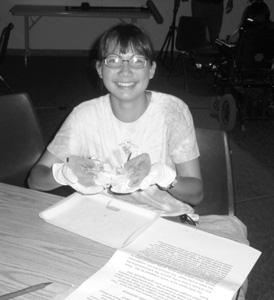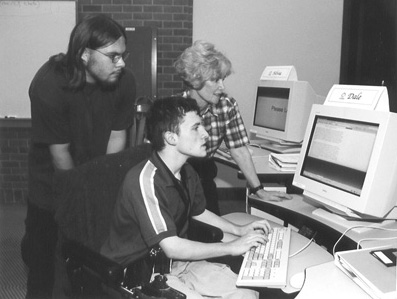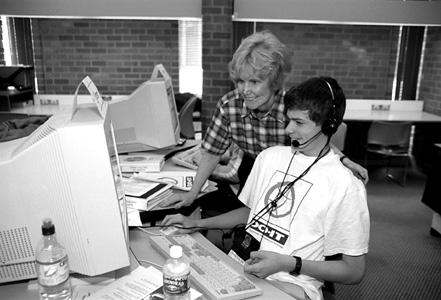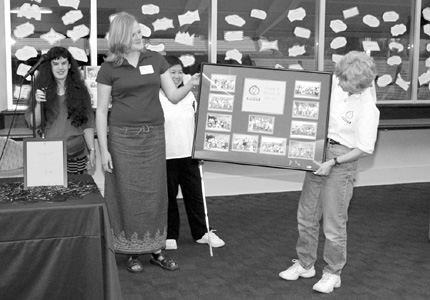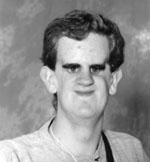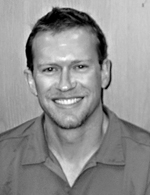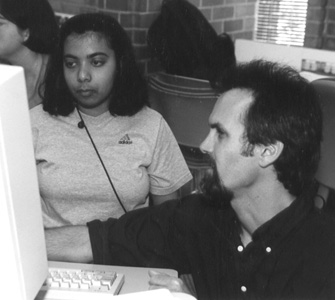DO-IT Phase I Scholars participate in a two-week, live-in summer study session on the University of Washington campus in Seattle, Washington. They learn about college life; surfed the Internet; interacted with peers, staff, and mentors; and had fun. Below, '02 Phase I Scholars share some of their experiences. Note that some articles were edited by DO-IT staff to make them short enough to include in this publication. Additional articles by Scholars can be found in earlier newsletters at www.washington.edu/doit/news/do-it-news.
Our Experience with the DO-IT Program
By Scholars Silvia and Saroj
This is one of the best programs for disabled students who want to succeed in life. This was our first summer, and we had a blast. We learned many new things, meeting so many people, some with disabilities, and learned new procedures for out of high school requirements. We also learned things to look for in a college. We also went to Microsoft, The Pacific Science Center, the Museum of Flight, and the Burke Museum.
We learned with computers, too. We created a Web portfolio, a resume, and other different things to prepare for college. Getting away from home can be scary, but we learned to be more independent even if we have a disability. Other individuals with disabilities who have a job or are going to college gave us tips on how we can succeed in life with a disability.
People like us with a disability don't really know how to ask for accommodations in a college campus or in the classroom. While we were there, we had a group discussion on the accommodations we need for college and how to ask for them. That helped many individuals with disabilities. Now we are not afraid to ask for accommodations.
In this program we have also done experiments and exercises. For example, we performed heart surgery on a sheep heart. We had to replace a valve for a needy sheep to get a feel for what a surgeon does. For our exercise, we did an event called Skiforall. It's where people with disabilities can ride special bikes. We could either go out pedaling using our hands or our legs. We had so much fun.
The best part of the DO-IT was meeting other individuals with different disabilities. We got the feel of what a college campus is like and expanded our computer skills. Every student with a disability deserves to succeed in life like other people. This program can help you reach your goal in life. Thanks DO-IT for giving us the opportunity to be in the program. We will miss you all, see ya all next year and year-round on the Internet!
Ice Cream on the Ave
By Scholars Natalie and Amy
On the 1st of August we went to the "Ave" for ice cream, not just any Ave either, it's the main street of the business area near the University of Washington located on University Way. The ice cream place was called Häagen-Dazs. There were many different flavors for us to choose from and also many different types of cones, too. Flavors that were the most popular were:
- Cookie Dough
- Chocolate Chip Mint
- Cookies & Cream
- Swiss Almond
- Vanilla Chocolate Chip
- Pralines & Cream
- Macadamia Nut
- Brandy Almond
- Coffee
They had these choices for cones:
- Sugar cone
- Dipped waffle cone with chocolate and nuts
- Dipped waffle cone with sprinkles and chocolate
- Also plane kinds, too.
Häagen-Dazs was just a little place on the corner. It had friendly people and they were very willing to help. They also were able to work under pressure because there were about 25-30 people and we had to get in and out so they had to work fast and we had to think fast about what we wanted.
There are so many different things to choose from you could be there all day long.
Social Life and Free Time
By Scholars Scott and James
The first topic we are going to talk about is the pool play. The second we will talk about was the Nintendo64 (N64) game playing.
The first day we went and played pool. Unfortunately there was no chalk, so no exceptional shots were made. The 10-ball was replaced by a former 12-ball that had lost so much of its paint that it looked like the cue ball. The light played tricks on our eyes causing us to accidentally hit Caleb with a ball. The Texan joined us in our games.
When we found the N64 in the computer room, we sat in front of the glowing screens for hours at a time. Chris brought in Super Smash Brothers and in the process, invited a larger crowd to indulge in four-player madness from 9:00 PM to 10:30 PM. Silvia drove a forklift into Zach's stolen police car while Nathan drove a nail file shaped car covered in solar panels.
These are interesting points we made about social life. We hope you find this information funny and interesting.
Dorm Life
By Scholar Leon
When you think of dorm life, what do you think of? Possibly the bad food or the horrendous room conditions, with no space to really move. But there are some good things about dorm life such as the kindness of the people, the activities, and the overall experience. The dorm rooms at McCarty Hall are great because there are two sets of drawers, desks, book cases, and two twin beds with sheets on them in every room on every level. The dorm has a main lounge with a partially covered outside area and an inside area with items including a pool table and a ping pong table. In addition, with all the other games and equipment, the people who live in the dorms are maybe the most important because a person can meet fellow dormmates in a dorm and become friends with them. They may keep their friendships for years to come.
Around college campuses, people are extremely friendly to other people, even to disabled people. Another thing is that everyone is helpful! For example, if a person who is in a wheelchair can't get into his room and a person walking by helps him into the room, it is courteous, helpful, and relationship-building. Dorm life is exciting because of the various things that are happening throughout the year, from the clubs/parties, to the individual sports, such as baseball, to the art or music performances on campus for the general public. Life in a dorm can sometimes be a drag, there are a lot of people in a small space. Overall, dorm life is a great experience to take part in but there are some minor drawbacks.
DO-IT Phase I Scholars "Get to the Heart of It"
By Scholars Alexandra and Rima
At 2:00 PM Tuesday, August 6th a needy sheep rolled into the operating room, its heart and lungs at the mercy of the eager, but inexperienced, hands of DO-IT Phase I Scholars. The sheep heart needed a faulty valve replaced and a coronary bypass. Actually, it needed a little more than that, but we did attempt miracles. Anticipation and even a hint of dread rippled through the room as the trays of preserved hearts, blades, tubing, and chalk were presented to each group, followed by rubber gloves.
Furrows of concentration lined the foreheads of many Scholars as they suspended the blades, poised above the congealed mass of cholesterol blocking a coronary artery. To bypass the blockage, one end of a rubber tube is inserted into an "x" created by two precise cuts while the other is connected to another "x" in the side of the aorta.
After gaining confidence through this relatively simple procedure, this group of budding cardiologists attempted a valve replacement. An incision was made in the side of the right atrium, the softest part of the heart. From there the surgeon probed a finger deep into the chamber in search of the opening to the artery with the troubled valve. Finally, the procedure was completed when the opening was found and the valve (chalk) was fitted into the narrow passage to regulate blood flow.
Phase I Scholars, Caleb and Dale, explore internet resource in the summer study computer lab with director, Sheryl Burgstahler
Phase I Scholars Caleb and Dale explore Internet resources in the Summer Study computer lab with director Sheryl Burgstahler.
DO-IT Scholars proclaim the activity as a thrilling success. As for the sheep, we can honestly say that he was not negatively (nor positively) affected by any of the procedures.
UW: All Access or Restricted Area
By Scholars Caleb and Dale
During our time at the UW we, "Caleb and Dale," have roamed far and wide across the campus. Dale uses a wheelchair so he has experienced some accessibility issues. Overall the UW campus is fairly wheelchair friendly with its many elevators, ramps, and automatic doors. There are a few places where further improvement would be helpful. One of the first things we noticed was that the dorm room doors could be a little wider. Currently a student in a wheelchair has to approach the door at almost a ninety-degree angle. This causes the wheelchair to block the flow of traffic through the hallways, which in an emergency is a hazard. On the positive side the dorm rooms, even the smallest ones, have proved to be comfortable and habitable for disabled students in general.
The dining room in Hagget Hall is an example of good accessibility. The staff is helpful whether requested or not and the room itself is clutter-free, which allows for easy movement. Plus the food is great in both quantity and quality. Outside, however, in the conference eating area the story is not the same. Instead of rows of rectangular tables, there are several circular dining tables that are close together. This is fine for a quiet night on a date, but people in wheelchairs cannot scoot in close enough to avoid getting food in their laps. To remedy this, we suggest that a few square tables be added in along with more room to move around with a wheelchair. The other thing we noticed is that a few of the bathrooms should be remodeled to better accommodate wheelchairs, such as the older ones that have not been redone since the fifties. Other than those few, the bathrooms have been very wheelchair friendly.
Although we have not seen all the possible accessibility problems that may exist, our experience with campus accessibility has been a good one. We feel that with just a few minor adjustments and continued disability awareness, this university will be remembered not only for its fine educational programs, but also for its excellent accessibility.
The Final Frontier
By Scholars Ian and Jared
Towering six stories tall over an audience enthralled with amazement, the Imax theater at the Pacific Science Center features a presentation of "Space Station 3-D" that offers an experience to which nothing can compare.
Unlike traditional movies in 3-D, Imax utilizes a groundbreaking technique which blasts the viewer straight into the action. During the filming process, a special camera was used to record the same image, but from two different angles. The images are then combined on the screen. During the movie, viewers are instructed to wear a special headset which rapidly alternates blocking the left or right eye. Doing this forces the brain to combine both images on the screen, creating the effect of a stunningly realistic 3-D environment. At one point the entire audience leapt from their seat as a cloud of flying debris seemed to be heading straight for them.
As for the movie itself, "Space Station 3-D" provides an in-depth look into the construction, maintenance, and potential of the new International Space Station. Astronauts must go through extensive and meticulous training in order to be prepared for the worst-case scenario. Once upon the Space Station, they can perform experiments, which are not possible on Earth, furthering our research in some day achieving a manned journey to Mars.
The unity of breathtaking 3-D technology and the amazing story of the Space Station makes for an incredible experience for everybody.
Computer Lab: Accessibility For Everyone
By Scholars Jacob, Ryan and Andrew
Director, Sheryl Burgstahler, and Phase I DO-IT Scholar, Carson, in COLLAB.
Director Sheryl Burgstahler and Phase I Scholar Carson in COLLAB.
The computer lab for the DO-IT Summer Study enabled us to interact with people who live many miles away. The World Wide Web brought the world to our fingertips. For someone with disabilities and restrictions, the adaptive technology in this lab allowed endless and unrestrained access.
Microsoft
By Scholars Gimmie and Chris
DO-IT Scholars had a chance to visit Microsoft studios in Redmond. While at Microsoft, we learned about adaptive technology for different disabilities that are being integrated into the new Microsoft programs, and were also given a chance to have a discussion with a panel of employees who have disabilities.
In one of the lectures, the speaker stated that Microsoft was adding accessibility to its list of priorities. For someone with a disability, they want the user to be able to install a program and have it ready to run without needing to buy or install more accessible software. To accomplish this Microsoft is now making certain programs such as screen reader, a screen magnifier, and an on-screen keyboard a standard for their new operating systems so that a variety of users can access the computer, although some might still need more complex programs.
Scholars were able to talk to four of Microsoft's employees that had disabilities. They talked about what they found out at college and things that they wished they had known about before they went. This panel also discussed that simply having a college degree doesn't guarantee a job, but if you gain experience through internships you have a better chance of getting hired or finding out early that the certain field isn't a good fit for you.
At the end of the Microsoft visit we were reminded that every day technology is getting faster, smaller, and cheaper. With the growth of Microsoft internationally, they are always in need of skilled employees, and we should never be afraid to try something just because we have disabilities.
The Burke Museum
By Scholars Rebecca and Angela
The Burke Museum is home to Washington's only real dinosaur fossils and has a world-renowned collection of the Northwest Coast Native Art.
When you walk in to the Burke, to your right is the museum store. There are a lot of things you can get there. If you go straight ahead from where you enter, there is the Life and Times Exhibit. That had a lot of dinosaurs, volcano, and Native art. That part was very interesting.
There is also a temporary Exhibit Gallery. When we went there, it was an earthquake exhibit. It was all about the last big earthquake we had in February of 2001. There was also a simulation where you press a button and you will see two buildings that were constructed on two different foundations, they will shake and one of them shook really bad and the other didn't.
Downstairs is the area is for Pacific Voices. When you walk around, you see about 17 different ethnic communities. Each of the communities chose an example to share in this exhibit. There are real good snapshots that explain their way of life. The Communities represented in the Pacific Voices all have their roots around the Pacific Ocean, in the Pacific Northwest, Asia, or the Pacific Islands. The exhibit includes China, Laos and Vietnam, Philippines, Korea, Japan, New Zealand, Samoa, Northern Alaska, Hawaii, Northwest Coast, and has smaller displays from Islands in Indonesia and Micronesia. If you would like more information, then check out www.burkemuseum.org/.
